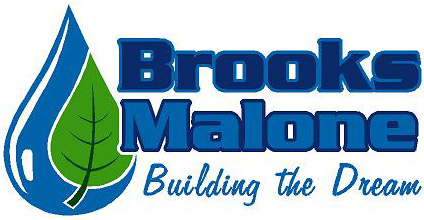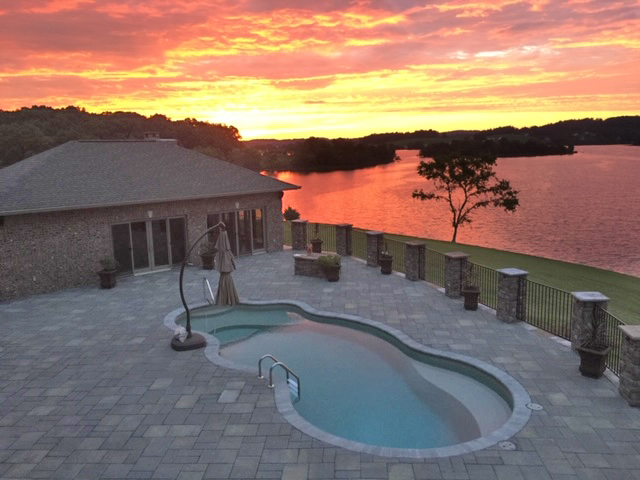Evaluating Pool Construction Material Options
In one of our recent posts about preparing to invest in a swimming pool, we discussed decisions you need to make when planning to build an in-ground pool. One of those decisions has to do with what type of material you’d like your pool made out of.
Brooks Malone, northeast Tennessee’s premier pool installer, is here to help with information on your options. We want to help you make the best decisions possible for you and your family. No matter what type of pool or which pool contractor you are leaning towards, feel free to call us with questions.
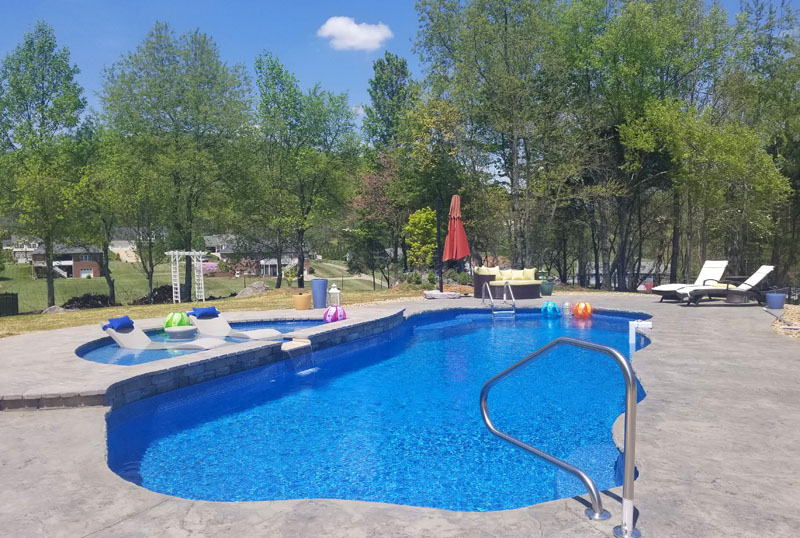
There are three main types of pool material: concrete, vinyl, and fiberglass. Each of them has its own advantages and disadvantages depending on your budget, vision, and available space.
So, Which Pool Type is Best?
The answer is easy: it entirely depends on what you want out of your swimming pool. Preferences for pool material are going to vary from family to family. You can choose what material best suits your vision, expectations, budget, and lifestyle. Take a look at our pools portfolio to get some ideas!
The good thing is that while there are just a few options for pool material, there are endless ways to customize each of option. So, if your yard has enough available space and your budget accommodates, you can have whatever want!
It is important to understand the benefits and drawbacks of each material. That way you can make a good decision by aligning your preferences with the pool material. Brooks Malone is here to assist you through the process of making your dream of owning a pool come to life!
Here is more in-depth information about the pros and cons of the available options.
Concrete or Gunite Pools
When you think about a swimming pool and what comes to mind is the neighborhood public pool or outdoor waterpark, then it is most likely a concrete pool. Pool concrete – also called gunite – is a mixture of concrete and sand. It is installed by spraying the mixture over the excavated surfaces of the pool. It offers a lot of flexibility when it comes to shape and size.
Concrete lends itself easily to limitless levels of customization. You can create a pool as big or as small and in any shape as you want with minimal restrictions.
The initial cost of installation for a concrete pool can be quite expensive. These types of pools also require renovation or resurfacing every 3-7 years. Depending on the climate and soils, concrete pools can also be prone to cracking which can require expensive repairs. With a concrete pool, you trade its design flexibility with what are typically the highest long-term costs.
Concrete pools take a little longer to install, approximately 2-4 months. Warranties for concrete pools are typically only 1-5 years. In addition, they require more maintenance, like heavy brushing and filtration. They also use more chemicals and electricity because of their porous surface, which tends to harbor algae and absorb chemicals easily.
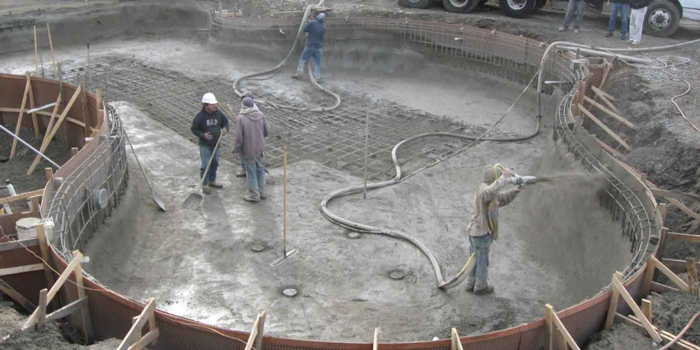
Be careful to weigh all of the pros and cons for a concrete pool and its more extensive maintenance requirements. If concrete pools are not cared for properly, they are prone to algae infestation. Before investing this type of pool material, be sure to have a cleaning schedule in place to avoid potential problems. If you don’t have time to maintain the pool, hire a cleaning and maintenance service to help you out regularly.
On the other hand, concrete pools can be uniquely customized in whatever shape and size the pool owner can imagine. If an elaborate or extraordinary swimming pool is what you’re after, concrete may be the way to go.
However, they don’t usually contribute significantly to a home’s resale value due to the relatively high maintenance and repair requirements.
Vinyl Pools
A vinyl liner swimming pool uses a custom-made plastic lining that stretches across the walls of the pool structure to hold in the water. Similar to concrete, vinyl liner pools afford pool owners a wide-range of sizes and shapes to meet your vision. They also can fit a wide range of budgets, and usually come with limited warranties.
Speaking of warranties, if you chose a vinyl liner, be careful that the warranty doesn’t just apply to the seams. Like any contract, be sure to review it carefully. Have a clear understanding of all of it, especially the warranty section. Some liner warranties that state 20 or 30 years have very aggressive proration after the first few years.
The installation process for a vinyl liner involves careful planning as it is custom fit to the walls of the pool. They typically take an average of six to eight weeks to install.
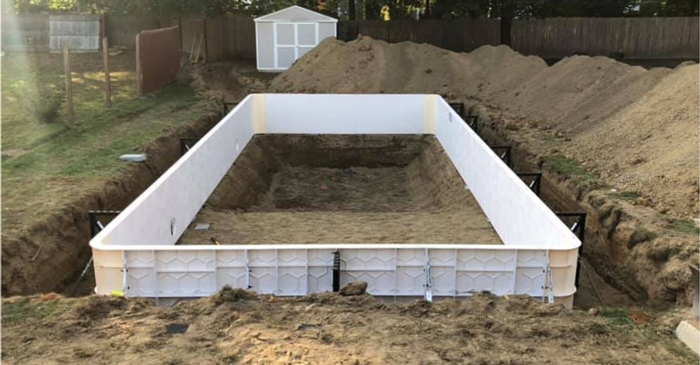
Vinyl liner pools are smooth to the touch and nonporous, unlike the rougher plaster surface of many concrete pools. Although the surface is relatively resistant to algae buildup, it is permeable. This requires regular and thorough pool cleaning habits. However, it only uses slightly more electricity to run compared to a fiberglass pool.
Vinyl liners can be easily damaged, by the family dog, sharp branches, etc., which can lead to costly repairs. A well-maintained, high-quality, and well-installed vinyl liner could last between 7-10 years. Which means it will need to be replaced regularly during the pool’s lifetime.
Of all the pool materials, a vinyl liner pool usually has the lowest up-front cost. Keep in mind, that the more tailor-made a vinyl liner pool becomes, the more expensive it will ultimately be. Adding steps, seats, tanning ledges, or other custom features can chip away at the cost advantage.
Vinyl liner pools do not hold their value as well as other pool types, as they require frequent liner replacement and are more susceptible to damage.
Fiberglass Pools
A fiberglass pool is built up with several layers. The material is a combination of fiber-reinforced polymer made of a plastic matrix strengthened by fine fibers of glass. Yeah, that was a little too scientific.
The important thing to remember is that this construction makes fiberglass lightweight, but very strong, flexible, but extremely durable.
It is the only pool type that comes pre-assembled from the factory. That simplicity and convenience make it an attractive option for potential pool owners. Since they are pre-made, they boast consistent and reliable construction quality.
Fiberglass pools are built ready for quick installation – usually less than two weeks with weather permitting. Because it arrives on a truck, this may limit your choices for size depending on your available space. However, the top manufacturers offer a wide variety of dimensions, colors, and styles to choose. Options include diving pools, long sport/lap pools, and even integrated units that combine pool and spa features.
In fact, you can choose ones with seats, tanning ledges, waterfall features, bubblers, spillover spas, and vanishing ledges. Even though fiberglass pools don’t offer as much customizability, there are plenty of options to choose from. You can even add custom mosaic tiles and LED lights to fashion a swimming pool as unique as you are.
At installation, fiberglass pools are a bit more expensive than vinyl liner pools, but less than concrete pools. However, fiberglass pools uniquely require little long-term maintenance – as they do not usually have to be resurfaced or require major renovations.
In addition to minimal long-term maintenance, the surface of a fiberglass pool is impermeable and resistant to algae growth. Its nonporous nature reduces the amount of chemicals and time needed to maintain the pool.
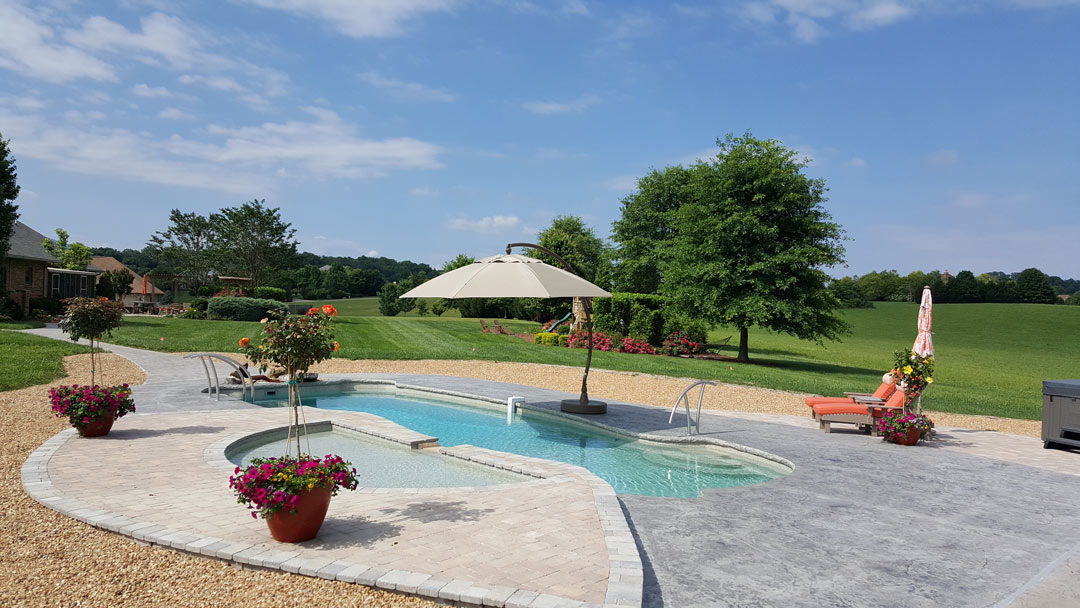
Using less chemicals is easier on your wallet. Spending less time cleaning means more time enjoying your pool! Moreover, its surface is smooth and nonabrasive due to a special outer gel coating. So, no more rough, sore feet and nicked swimsuits.
Finally, due to a fiberglass pool’s generally smaller size, they utilize less electrical power than the other pool types.
The combination of a quicker install, and less time and money for maintenance, make fiberglass the dominant pool system choice.
Making a Decision
There you have it! Brooks Malone has hit the high points of the advantages and disadvantages of each pool type available on the market. Now, you have enough information to make an informed decision as to what pool type fits your particular situation best.
Each of the different pool materials serve their inherent purposes well and are perfectly fine choices. It really “just depends” on your vision, budget, expectations, and lifestyle. So, grab a piece of paper and start brainstorming your ideas and desires.
Be sure to consider the full impact of your choice looking out into the future. Besides just fitting your budget and lifestyle, making the best decision requires you to also plan ahead. When you consider all of the factors above, determining what pool type suits you best and affords the best value will be less difficult.
Hopefully, after reading this post and doing some research on your own, you have the knowledge necessary to choose the pool type that best serves you and your family. Or, at least, to get you started!
If you are in the upper East Tennessee area, and want to explore the idea of building an in-ground swimming pool, please give us a call at Brooks Malone. We’re happy to help you with any further questions about vinyl liner or fiberglass pools. Sorry, we don’t install concrete ones.
Brooks Malone prides itself on providing the highest possible product and service. Over the last 25 years, we have gleaned, through experience and continuous training, the skills and knowledge to be designated as a premier pool builder in northeast Tennessee. In fact, we are the only premier pool builder in this area!
We are your one-stop source for all of your swimming pool, landscaping, hardscaping, and outdoor living needs. So, give us a call or explore our website for more information on “building the dream!” And make sure to check out our customer testimonial page.
